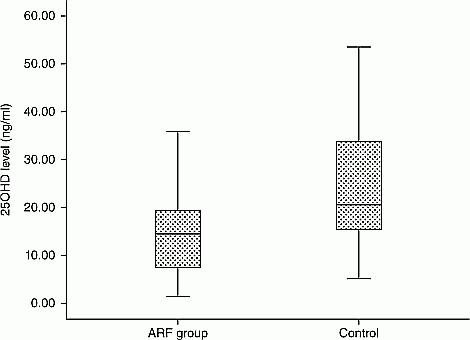ESPE2016 Poster Presentations Bone & Mineral Metabolism P2 (44 abstracts)
Potential Role of Vitamin D in Pathogenesis of Acute Rheumatic Fever
Sertaç Hanedan Onan a , Huseyin Demirbilek b , Bedri Aldudak a , Meki Bilici c , Fikri Demir c & Murat Muhtar Yilmazer c
aDepartment of Pediatric Cardiology, Diyarbakir Children’s State Hospital, Diyarbakir, Turkey; bDepartment of Pediatric Endocrinology, Diyarbakir Children’s State Hospital, Diyarbakir, Turkey; cDepartment of Pediatric Cardiology, Dicle University Medical Faculty, Diyarbakir, Turkey
Background: Acute rheumatic fever (ARF) is a non-suppurative complication of Group A beta-hemolytic streptococcus pharyngitis. The underlying mechanisms have not been fully elucidated. A series of autoimmune processes are thought to be involved in pathogenesis. Low vitamin D levels have been reported in various autoimmune diseases.
Objective and hypotheses: The aim of the present study is to evaluate the association of vitamin D levels and its impact on the disease phenotype in children with ARF.
Method: Thirty patients diagnosed with ARF according to the modified Jones criteria and 16 age- and sex-matched healthy controls recruited. An echocardiographic evaluation was performed and serum calcium, phosphorus, alkaline phosphatase, magnesium, parathormone, and 25(OH) vitamin D (25(OH)D) levels were measured in all participants. Patients with ARF had been evaluated according to the presence and severity of carditis.
Results: Serum 25(OH)D levels was significantly lower in patients with ARF compared to the control group (14.56±8.31 μg/l vs 25.41±1.38 μg/l, P=0.002) (Figure 1). A 25(OH)D level<50 nmol/l (20 ng/ml) suggesting vitamin D deficiency was detected in 23 of 30 patients with ARF (77%) and 8 out of 16 controls (50%) (P=0.066). Serum magnesium levels were found higher in ARF group compared to controls (2.17±0.28 mg/dl vs 1.95±0.09 mg/dl, P=0.001).
Conclusion: In this, to our knowledge the first study evaluating the 25(OH)D levels in children with ARF, 25(OH)D levels was found lower in patients with ARF suggesting potential role of vitamin D deficiency in development of ARF.

 }
}



